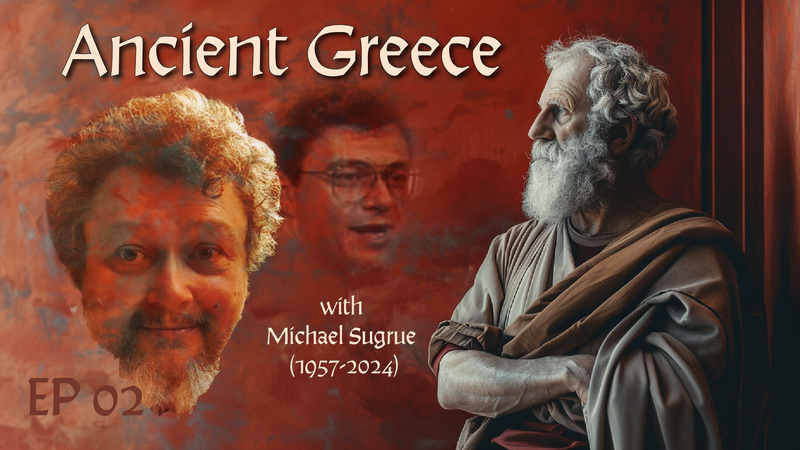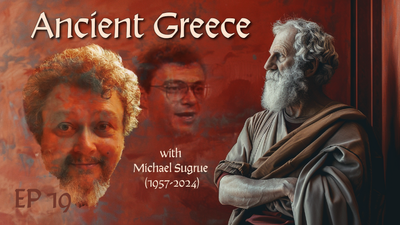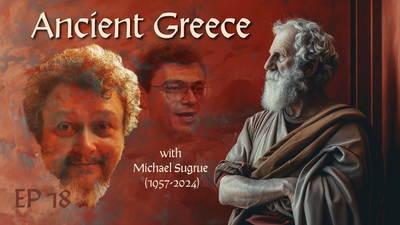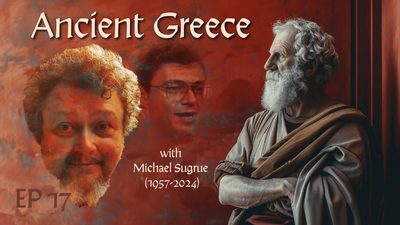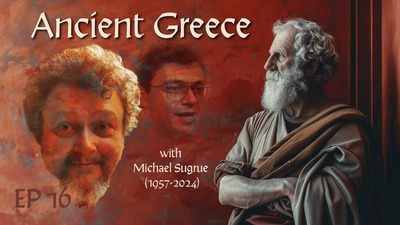Dr. Michael Sugrue emphasizes Aristotle’s belief that happiness (eudaimonia) is the highest good—a goal that is pursued for its own sake. Aristotle argues that happiness is an activity of the soul in accordance with virtue. This means that it isn’t something passive or momentary; rather, it involves living a life of purpose, cultivating virtues such as courage, temperance, and wisdom. Sugrue’s commentary reminds us that Aristotle's concept of happiness is rooted in the practice of rationality, where achieving our highest potential is more fulfilling than indulging in short-term pleasures.
For example, Aristotle contrasts the life of a virtuous person with that of a hedonist. The hedonist may seek pleasure in excess, mistaking temporary satisfaction for true happiness. However, the virtuous person finds joy in actions that align with their principles. As Dr. Sugrue explains, Aristotle would argue that the hedonist’s happiness is like that of grazing animals—content with base pleasures but missing the deeper fulfillment that only virtuous actions can bring.
Imagine this in a modern context: a successful career built on integrity versus one built on manipulation. Both might yield outward success, but only one leads to inner fulfillment. Aristotle’s timeless wisdom invites us to reflect on the choices we make and whether they align with our greater purpose.
Insights from the Dialogues: Courage and Wisdom in Laches
In Plato’s Laches, Socrates engages with Nicias and Laches to explore the nature of courage. The dialogue challenges superficial definitions of courage, such as facing dangers without fear, and instead presents a deeper understanding: courage as the ability to endure hardships with knowledge of the greater good. Laches, a seasoned general, initially defines courage as standing one’s ground in battle. However, Socrates pushes him to question whether mere physical bravery is enough.
Through a series of probing questions, Socrates demonstrates that true courage is not just blind bravery. Instead, it must be informed by wisdom, guiding one to make choices in the face of uncertainty and risk. The dialogue reveals that genuine courage requires knowing what is worth facing and enduring, as well as what should be avoided.
The discussion in Laches is as relevant today as it was in Ancient Greece. Consider moments in your life where you’ve needed to balance bravery with careful judgment. Whether it’s making a tough career decision, speaking out for what’s right, or navigating personal challenges, Plato’s dialogues encourage us to view courage not just as strength, but as thoughtful perseverance in the pursuit of the good.
Chance and Fate: Knucklebones and How Ancients Calculated Risks
In the world of ancient Greece, games of knucklebones (astragali) were more than mere pastimes. The Greeks saw these games as symbolic reflections of life’s uncertainties. Players would cast the small bones, not unlike modern dice, and interpret their outcomes as representations of fate. Knucklebones became a metaphor for decision-making, where luck, skill, and prudence all played a role in determining the outcome.
This connection between games and life can be seen in the way the Greeks approached courage. Just as a skillful player recognizes when to take risks and when to play cautiously, a virtuous person knows when to face challenges and when to exercise restraint. It’s a delicate balance, one that Plato explored in his dialogues as a key element of virtue.
Explore the Mystical World of Astraguli: Ancient Games of Chance with Cultural Significance.
In our modern lives, we still face moments where calculated risks are necessary. Whether in business, relationships, or personal growth, there’s often a thin line between bravery and recklessness. Understanding how the Greeks linked games to virtues can help us reflect on our approach to risk and decision-making. Perhaps it’s time to engage with the ancient wisdom that saw life’s uncertainties not as threats, but as opportunities to cultivate our virtues.
Virtues Revisited: Practical Lessons for Today
Courage is the virtue of confronting the unknown with resolve, tempered by wisdom. It’s not about recklessly charging into danger, but thoughtfully facing life’s challenges. Plato’s dialogues remind us that courage isn’t merely a heroic trait; it’s an essential part of living a fulfilled life. By practicing courage, we gain the strength to pursue what’s right, even when the outcome is uncertain.
Today, we can apply this ancient wisdom to our own lives by examining our fears and learning to approach them with knowledge and purpose. Whether it’s a personal struggle, a professional challenge, or a moral dilemma, courage guides us to act decisively in the face of uncertainty. The idea isn’t to live fearlessly but to face our fears with conviction.
Join us at planksip.org to share your reflections on courage and happiness. How do you define these virtues, and how have they shaped your journey? Let’s continue exploring these timeless concepts together, inspired by the wisdom of Ancient Greece.
Engage with Us: Reader’s Corner
What is your personal definition of happiness? Does it align more with the pursuit of pleasure or with striving for a life of virtue? How do courage and wisdom factor into your idea of fulfillment? We invite you to share your thoughts with the community on planksip.org. Selected reflections will be featured in our next newsletter, offering a platform for diverse insights and thoughtful dialogue.
Closing Reflection: Socrates’ Enduring Legacy
Socrates once famously declared, “The unexamined life is not worth living.” This statement serves as a reminder that happiness is not just about material success or fleeting pleasures but is rooted in self-examination and the cultivation of virtues. By continuously striving to live a virtuous life, we can achieve a deeper, more enduring sense of fulfillment.
As you reflect on this week’s themes, consider how courage and wisdom have played a role in your own life. What risks have you taken, and what challenges have you faced with fortitude? Through thoughtful self-examination, inspired by the great philosophers, we continue to grow in our pursuit of the good life.

Plato Re-Imagined
This course offers 32 comprehensive lectures exploring most of Plato's dialogues. These lectures guide students toward a consilient understanding of the divine—a concept that harmonizes knowledge across disciplines and resonates with secular and religious leaders. As a bonus, Lecture #33 focuses on consilience, demonstrating how different fields of knowledge can converge to form a unified understanding.

